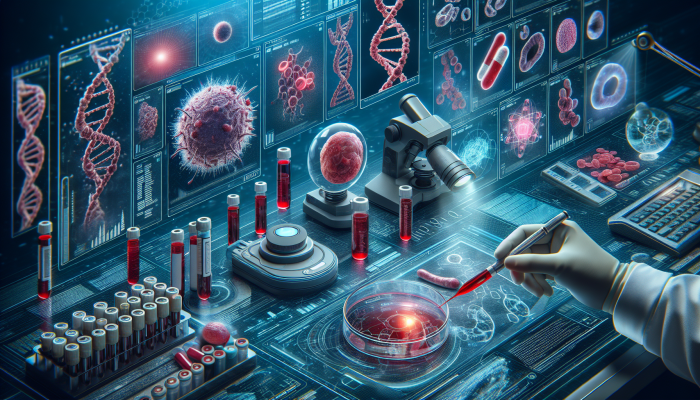Transforming Cancer Detection: Harnessing Advanced Blood Tests and Cutting-Edge Technologies
The domain of cancer detection is currently experiencing a significant transformation, primarily driven by the advancement of blood tests for cancer risk. These revolutionary tests represent a considerable leap forward in identifying potential cancer markers within the human body, which facilitates earlier medical interventions and substantially improves patient outcomes. To successfully navigate the complex and often overwhelming landscape of cancer diagnostics, it is crucial to develop a thorough understanding of the fundamental principles that govern these tests, as well as the latest groundbreaking innovations emerging in this vital healthcare sector.
Diving Deep into the Science of Blood Tests for Cancer Risk: A Comprehensive Exploration

At the core of blood tests for cancer risk lies the critical detection of specific biological indicators referred to as biomarkers. These biomarkers are essential signals that indicate the presence or an increased likelihood of developing cancer. They encompass a diverse array of substances, including proteins, genes, and other materials produced by either cancerous cells or the body's defense mechanisms reacting to the existence of cancer. The scientific basis of these pioneering tests relies on advanced methodologies that accurately pinpoint these markers, employing a vast array of cutting-edge technologies to achieve precise results.
A key methodology utilized in these evaluations is the liquid biopsy. This innovative technique involves analyzing a blood sample to detect components such as circulating tumor DNA (ctDNA) and circulating tumor cells (CTCs). The non-invasive nature of this approach allows for a comprehensive assessment of a patient’s cancer risk without requiring more invasive procedures like traditional biopsies. Additionally, advancements in technology, particularly in next-generation sequencing (NGS), have greatly enhanced the sensitivity and specificity of these tests, enabling the detection of even the smallest traces of ctDNA.
The accuracy of blood tests for cancer risk is closely linked to our understanding of cancer biology. Different cancer types release unique biomarkers into the bloodstream, driving ongoing research aimed at discovering new markers that could function as early warning signals. For instance, monitoring levels of prostate-specific antigen (PSA) is common practice for evaluating prostate cancer risk, while the CA-125 marker is frequently associated with the detection of ovarian cancer.
Moreover, the integration of artificial intelligence (AI) into the analysis of test results is significantly altering this field. AI algorithms can process vast datasets, identifying patterns that may escape human observation, which greatly enhances the predictive capabilities of these tests. This synergy between technology and diagnostics is paving the way for more effective cancer detection strategies.
Unveiling the Latest Breakthroughs in Blood Tests for Cancer Risk: Essential Developments
The landscape of blood tests for cancer risk is currently witnessing remarkable innovations that have the potential to redefine cancer screening and prevention methodologies. A particularly notable advancement is the development of multi-cancer early detection (MCED) tests. These groundbreaking tests are designed to identify multiple cancer types from a single blood sample, significantly decreasing the need for invasive procedures and enhancing patient comfort during the diagnostic process.
Recent studies have demonstrated that MCED tests can effectively identify cancers at their earliest stages, often prior to the onset of any clinical symptoms. Early detection is vital, as it is directly linked to improved treatment outcomes and higher survival rates. For instance, a study published in a leading oncology journal highlighted the remarkable capability of an MCED test to identify malignancies that are typically difficult to diagnose early, such as pancreatic cancer and ovarian cancer.
Another significant development in this arena involves the analysis of methylation patterns in circulating DNA as a diagnostic tool. Changes in methylation often indicate cancerous processes, prompting researchers to investigate how these patterns can be utilized for more precise cancer risk assessment. This advanced technique could provide a highly sensitive method for detecting malignancies for which effective screening protocols are currently unavailable, thereby enhancing patient care.
Furthermore, collaborations between technology firms and healthcare providers are driving the innovation of advanced diagnostic tools. These partnerships aim to leverage big data and machine learning to refine blood sample analysis, resulting in more accurate risk assessments and personalized management strategies for patients, thereby improving overall healthcare delivery.
Understanding the Transformative Power of Liquid Biopsies in Cancer Detection and Treatment Strategies
Liquid biopsies represent a revolutionary advancement in the field of blood tests for cancer risk. Unlike traditional biopsies that require invasive tissue samples, liquid biopsies offer a minimally invasive alternative that can be performed multiple times, facilitating continuous monitoring of cancer progression or treatment responses. This capability is especially advantageous for patients who may not be suitable candidates for surgical biopsies due to various health concerns.
Liquid biopsies function by isolating and examining ctDNA or CTCs obtained from a blood sample. The capacity to monitor these cellular components provides invaluable insights into tumor dynamics and potential genetic mutations that may arise throughout the disease course. For example, identifying specific mutations can aid oncologists in selecting targeted therapies, thus personalizing treatment plans for enhanced therapeutic effectiveness and success rates.
The integration of liquid biopsies into clinical practice is already producing promising results. Recent clinical trials have shown that these tests can detect recurrences in patients who have previously undergone cancer treatments, often several months before traditional imaging modalities. This timely identification can enable prompt interventions, ultimately improving survival outcomes and overall patient health.
Additionally, liquid biopsies facilitate real-time monitoring of treatment responses. By evaluating ctDNA levels during therapy, healthcare providers can assess the effectiveness of the treatment regimen and make necessary adjustments to optimize patient care. This proactive approach to monitoring signifies a significant shift towards more dynamic cancer management, ensuring that patients receive the most effective treatment tailored to their unique circumstances.
In summary, blood tests for cancer risk, particularly through the use of liquid biopsies, are revolutionizing the oncology landscape. Their potential for early detection, continuous disease monitoring, and personalized treatment strategies positions them as essential tools in the ongoing fight against cancer. As research and technological advancements continue to progress, the future of these tests in enhancing patient outcomes and transforming cancer care looks exceptionally promising and optimistic.
Join Our Facebook Community for the Latest Updates: Connect with Us!

This Article Was First Published On https://bloodtest.co.uk
The Article: Blood Tests for Cancer Risk: Pioneering Early Detection Methods appeared first on: https://ezbloodtest.com
The Article Cancer Risk Blood Tests: Innovative Methods for Early Detection Was Found On https://limitsofstrategy.com


I found your exploration of advanced blood tests for cancer detection incredibly insightful. The notion of using biomarkers to identify cancer risk earlier is both promising and deeply personal for many of us. Having witnessed loved ones struggle with late-stage diagnoses, it’s heartening to see technology making strides that could potentially change the trajectory of cancer care.
It’s heartening to hear your thoughts, especially considering the personal experiences you’ve had with loved ones facing late-stage cancer diagnoses. The way we approach cancer detection and treatment is indeed evolving, and it feels like we’re on the brink of significant breakthroughs.
You’re right; personal experiences with cancer can change how we perceive and engage with the topic. When someone we care about battles something as daunting as late-stage cancer, it shifts our understanding in profound ways. What struck me during those moments was not just the weight of the diagnosis, but the extraordinary resilience that can emerge—both from the patients and their families.
I appreciate your thoughts on the advanced blood tests for cancer detection. It really is a deeply personal issue for many, and it’s clear you’ve felt that weight through your loved ones’ experiences. The idea of using biomarkers to detect cancer earlier gives us all a glimmer of hope.
It really is a deeply personal issue, and I can relate to that on many levels. Watching loved ones navigate the complexities of cancer has opened my eyes to just how critical early detection is. The use of biomarkers in blood tests feels like a promising step forward. It’s fascinating to think about how far technology has come in healthcare, and how integrating data science into medicine can truly change outcomes.
It’s so true—seeing loved ones face the challenges of cancer can be overwhelming, and it really puts the importance of early detection front and center. It’s remarkable how something like a blood test can hold so much promise. The advances in biomarkers are exciting because they offer a way to catch issues earlier, which can make such a difference in treatment options and outcomes.
You’ve highlighted a crucial point. Watching loved ones navigate the complexities of cancer is truly a heavy experience. It’s not just about the physical toll but also the emotional strain it brings to everyone involved. The role of early detection can’t be overstated.
You raise an important point about the emotional weight of watching loved ones navigate cancer. It really does change how we view early detection. The idea that a simple blood test could signal trouble is both hope-filled and a bit unsettling, considering some people still think of cancer only in terms of what’s visible through conventional methods.
I completely agree with you; the personal nature of cancer detection really does make it a nuanced topic. Being able to detect something as daunting as cancer earlier, especially through advanced blood tests and biomarkers, does give a sense of agency back to individuals and families.
You raise an important point about the personal nature of cancer detection. The emotional weight that comes with a potential diagnosis can be overwhelming. What’s exciting about advancements in blood tests and biomarkers is that they offer a more proactive approach; it’s not just about reacting to symptoms anymore.
“I’m glad you resonate with that perspective! To dive deeper into the topic of advanced cancer detection and explore some cutting-edge solutions, check out this insightful resource.”
https://awesomeappearances.com/ParentAler
The personal nature of cancer detection really does set the stage for a lot of deep conversations. When we talk about advanced blood tests and biomarkers, it feels like we’re entering a new era—one where people can take a more proactive approach towards their health. This shift empowers individuals, allowing them to feel more in control of their health journeys.
You’re spot on about the personal nature of cancer detection. It’s such a deeply individual journey, and the feeling of being more in control can change everything. With advances in blood tests and biomarkers, people now have options and a clearer picture of what might be happening inside their bodies. It opens up conversations that were often left on the sidelines, allowing families to share concerns and support each other in a way that’s proactive rather than reactive. Plus, the emotional weight of early detection can’t be overstated; it not only affects treatment choices but also how someone navigates their day-to-day life. It’s pretty incredible how science is reshaping those personal stories. What do you think are the most significant changes this brings to patient-doctor relationships?
It’s encouraging to hear that you found the discussion on advanced blood tests for cancer detection meaningful, especially considering your personal experiences. The emotional weight of witnessing loved ones face late-stage diagnoses can be profound, and it’s clear that many share this concern.
I’m glad you found the article meaningful! If you’re interested in learning more about the latest advancements in cancer detection and how these tests can make a difference, check out this resource for further insights.
https://awesomeappearances.com/eComToolkit
I appreciate your thoughts on the emotional journey many of us face when witnessing loved ones navigate their health challenges. It’s a unique blend of helplessness and hope that often accompanies these situations. The struggles tied to late-stage diagnoses can cast long shadows, making any advancement in cancer detection feel like a small but crucial light breaking through.
It’s heartening to hear how personal this topic is for you. Advanced blood tests bring a sense of hope, not just for early detection, but also for a more tailored approach to treatment. The idea that we could pinpoint risks earlier means fewer people will face the hardships of late-stage diagnoses.
Thank you for sharing your thoughts! If you’re interested in learning more about how these innovative blood tests are reshaping cancer detection and care, I invite you to explore further insights here.
https://awesomeappearances.com/krystal
This is such an enlightening piece on a topic that impacts so many lives. The evolution of blood tests in cancer detection truly represents a beacon of hope for early intervention. It’s fascinating to consider not just the scientific innovations involved, but the human stories behind them—those families who have faced uncertainty, now potentially armed with more proactive options.
I appreciate your insights on this topic. The evolution of blood tests in cancer detection does feel like a significant milestone, not just scientifically, but on a very personal level for so many families. It’s incredible to think about how early detection can change the narrative for those facing such a daunting diagnosis.